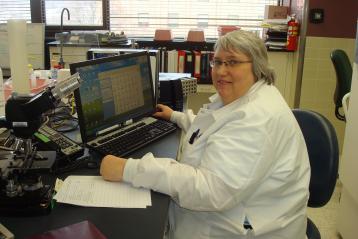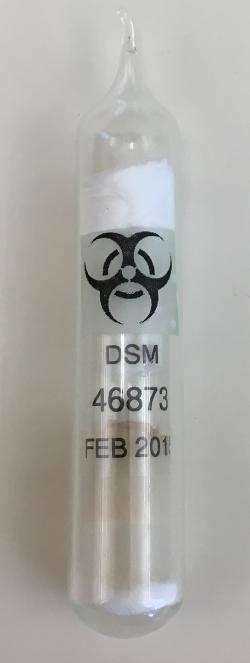
Laboratory sleuths at Nebraska Medicine and UNMC have discovered and named a disease-causing bacterium that was previously unidentified.
Discovering, naming and publishing a new organism is a big deal in the world of microbiology. Characterization of a new species helps health professionals around the world identify and appropriately treat infected patients. The new species was recognized as causing respiratory infections in patients with suppressed immune systems.
The organism, Mycobacterium talmoniae, is named to honor Kathy Talmon, a laboratory technologist who worked for the state public health laboratory in Lincoln before the lab’s move to the Nebraska Medical Center campus. She was a lead technologist in the tuberculosis lab at Nebraska Medicine when she retired in 2014.
“Kathy’s expertise was in tuberculosis detection,” says Peter Iwen, PhD, director of the Nebraska Public Health Laboratory at UNMC. “She also helped in the identification of other Mycobacterium species which led to the discovery of this new species. The honor of naming this organism for her highlights her contributions to the public health and TB laboratories.

“It was quite a surprise,” says Talmon. “I was astonished and really couldn’t believe it at first. It’s a great honor. In microbiology most names come from famous researchers.”
The case started when the new organism, detected from a patient with respiratory symptoms, did not identify with the usual tests used. Comparison using new tests led to the discovery of a new species. Additional comparisons also showed the organism to be identical to an unnamed organism reported in 2000 by an out-of-state lab.
In 2012, Dr. Iwen initiated the complicated process of validating a new species with colleagues at National Jewish Health in Denver, Colorado and Colorado State University in Fort Collins, Colorado.
“We worked hard to process through the tedious steps for species validation,” he says. “As a final step, the organism was recently published in the International Journal of Systematic and Evolutionary Microbiology. The newly discovered strain of mycobacterium is now part of roughly 170 officially recognized species within the mycobacterium genus.”
He says as a part of the validation process, the organism was “deposited” or registered in two culture collections, one located in Germany at one of the largest biological resource centers in the world, and the other in the U.S. at the American Type Culture Collection.
“Our new species, Mycobacterium talmoniae, adds to the literature of nontuberculous Mycobacterium and complements previous studies that led to the naming of another new species in 2004, Mycobacterium nebraskense,” he says.
Alison Freifeld, MD, and Sara Buss, MD also participated in the project.

